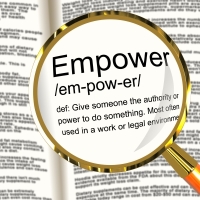 A Scout is Helpful. It’s right there in the Scout Law. Number three. A Scout cares about other people. He willingly volunteers to help others without expecting a reward.
A Scout is Helpful. It’s right there in the Scout Law. Number three. A Scout cares about other people. He willingly volunteers to help others without expecting a reward.
Except… when helping someone takes away an opportunity for them to help themselves.
Of course we want to help. But as we know, helping others doesn’t mean doing their work for them. You wouldn’t “help” your child by doing her homework, would you?
Much of the time, we are tempted to just jump in, grab the wheel and take care of a task ourselves if we feel it’s expedient, or we know how to do it better. But by doing so, we take away the opportunity for the other person to experience growth through self-enrichment.
This is true if we serve on a committee, but it’s even more important in working with youth who are learning to lead themselves. It’s in our nature to want the Scouts to learn the very best way – how to cook a meal, set up a tent or tie a knot – that we’d prefer to impart our years of wisdom. A cringe-worthy moment was when I visited a troop meeting where one of the adults was standing on a table, surrounded by Scouts, as he demonstrated how to tie various knots. The youth were followers, not leaders, and I’m sure there were at least a couple older Scouts who knew how to tie the same knots and who would have welcomed the opportunity to teach.
The point of Scout skill instruction is not mastery of the subject, but rather the personal growth that takes place as one Scout teaches another. Sure, the instruction might not be top-notch, but the learning Scout will learn, and the teaching Scout will learn even more. Doing it for them sends the message that they can’t be trusted.
Leadership consultant Dan Rockwell makes the point in his blog post that we can be most helpful, especially with novices, if we create a safety net with them. Not for them – with them. We identify what would make it possible for the new learner to face the challenge, and then we provide that support. Not the answers, but the encouragement and guidance. It’s much harder than just telling them or doing it for them, but there’s no reward in that.
Adults can sometimes be impatient with this technique, though. They would sometimes just rather have it done for them. Indeed, “just tell me what I need to do now!” is a frequent cry. And a new den leader might be overwhelmed and just wants to know the quickest way from point A to point B. Be patient, guide with appropriate resources, and ask lots of questions.
So before you go charging in with your helpfulness hat on, stop and think about the other person and how to best create an environment in which they can feel like they accomplished something worthwhile.
This post first appeared on Bobwhite Blather.



